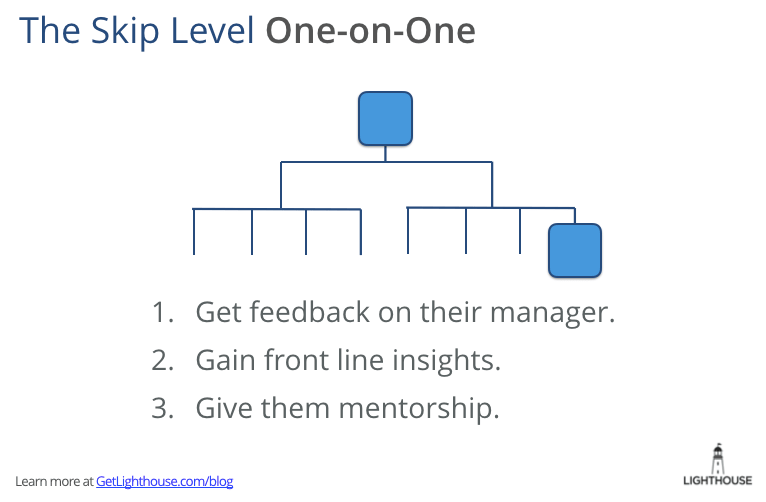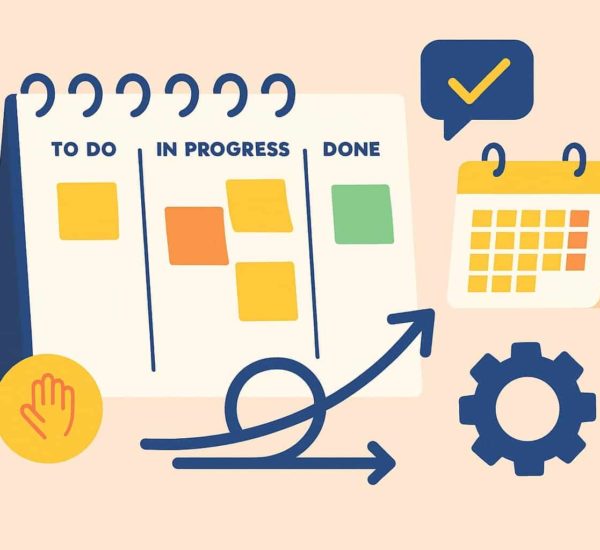Skip-level meetings have emerged as a vital managerial tool. They help managers understand the workings of an organization and spot organizational-level problems. It can be tricky to navigate these meetings. This article will guide you about all the aspects of skip-level meetings and how to take them effectively.
What is a Skip-level Meeting?
A skip-level meeting is one where the manager of manager meets with an employee who reports to the manager they manage. Usually, the person would talk to their managers directly.
A little confusing, but a skip level meeting essentially means that leaders high up in the chain of command have one-on-ones with employees much lower in the hierarchy. Sometimes, it becomes essential to ‘skip a level’ and talk to someone who is lower in the hierarchy to get a feel of how things are being done in the company.

How to Prepare for a Skip-level Meeting?
Managers’ time is precious and expensive. If you are going to take a 30-minute skip-level meeting, you should walk away with insights and valuable feedback on your organization. For that, you must prepare yourself well for the meeting. Otherwise, it would just be a waste of time. So, here’s how you can prepare for a skip-level meeting:
Do Your Research
A skip-level meeting format needs to be based on intelligent discourse. Before taking a skip-level meeting, do your research. Get to know what the other person has been working on and how far their projects have come. The meeting should be to gather crucial information. You can get generic updates on Slack or by talking to their manager.
Skip-level Meeting Agenda
Send your questions in advance so that the employee can think about them carefully. Often, people won’t be able to recall important insights if you ask for them on the spot. Create a list of 10-12 questions.
The questions should mostly include those that can elicit crucial information about the workings of the company, feedback on key decisions, issues with company policies, to name a few things. Skip-level meeting questions are crucial. Think carefully and draw up questions that are easy to answer but quantifiable.
Encourage Them to Ask Questions
You should encourage the employee to ask questions. The questions they ask can tell you about their concerns and how they think about things. If you see similar questions in different meetings, you can pinpoint the problems employees face in your organization.
What is the Purpose of Skip-level Meetings?
Finding out the skip-level meeting purpose will help both managers and employees. A skip-level meeting is to gauge how the organization is performing, how effective the company policies and decisions are, the improvements needed in the work culture, and the efficiency of operations.
These meetings let senior managers talk to employees low in the hierarchy freely. People are hesitant to provide honest feedback since their jobs and increments depend on how they are perceived by their bosses. With these meetings, you can assure your employees that they are in a safe environment and they should be honest.
Skip-level Meetings: Pros and Cons
Pros of Skip-level Meetings
First, we will talk about the pros of these meetings. Here are skip-level meeting benefits:
Transparency
With skip-level meetings, you can uncover things that the managers may have neglected to mention. Skip level 1-on-1’s can be the tool to uncover the true picture of your organization. Only when you know your organization inside and out can you make changes to increase its efficiency and improve the work culture, right?
Ideas
An open environment that promotes the sharing of ideas and knowledge will thrive. Skip-level meetings are crucial as they help you create such an environment. The insights provided in these meetings can be profound and immensely helpful.
Track Progress
Every company has visions and priorities. They make a plan to further such visions. To track whether the on-ground reality mirrors the vision, skip-level meetings are necessary. It is vital to know the values that are being promoted in the workplace.
Employee Engagement
Most employees want their opinions to be heard and valued. Even if you don’t consider them, hearing out what they have to say will increase employee engagement.
Cons of Skip-level Meetings
Now that we are done with the benefits of skip-level meetings, let’s talk about its pitfalls:
Insincere Employees
Some employees will have hidden agendas. They will feed you with incorrect information about their managers and the workings of the organization. It can be difficult to ascertain if employees are truthful with their criticisms or not.
The Problem of Who to Meet
Senior managers can be responsible for hundreds to thousands of employees. Only selecting highly-liked employees to meet and getting their feedback can be unproductive. A perception of favoritism might develop in the organization. Additionally, it is not possible to meet every person. You can try reducing the duration of meetings and increasing their frequency to meet with people from different groups and teams to solve this problem.
Misinterpretation of Words
Employees will pitch you many ideas during skip-level meetings. Be careful with what you reply to them. Sometimes, your words can be misconstrued, and employees can start implementing their ideas.
Conflict with Direct Managers
Employee feedback can lead up to them opening up to you with concerns about the operations of their managers. Your direct managers might think that you are undermining them or going behind their back. This can lead to conflict. To avoid this, tell your direct managers that you are meeting someone from their team. Additionally, some problems do not require your intervention. Do not interfere in matters that seem like they should be resolved between your direct managers and subordinates. Otherwise, skip-level meetings can provide you with excellent feedback on your direct managers.
Skip-level Meeting – Employee Perspective
A one-on-one with a skip-level manager can be an opportunity for employees to showcase their analytical skills. Skip-level meetings are an ideal way for employees to talk about their experiences and insights. Employees need to prepare themselves for a skip-level meeting as well.
- For that, they can analyze their experience at the organization, issues they have faced, and things that can be improved.
- Before you head onto a meeting, think about what you are going to say.
- Be concise and clear about your insights and ideas. Be candid with your replies and offer a fresh perspective about the organization. Don’t talk about trivial and petty issues.
- If you are well prepared, the senior manager might take up your idea and implement it.
Senior managers look for people with good analytical skills and ideas all the time. A skip meeting could be your time to shine. Offer broad insights that will impress the senior manager.
Things Skip-level Managers Need to Avoid
A skip-level 1-on-1 is a crucial weapon in the arsenal of a manager. These meetings can be tricky to navigate. You have to find the right questions, the right way of dealing with the answers and formulate a plan to address the organizational level issues employees are facing. The answers to these questions vary from case to case.
However, there are some things you need to avoid while taking these meetings, these are:
Don’t Take Decisions on the Spot
In skip-level meetings, employees will tell you their ideas, insights, and issues. You might be tempted to make decisions on the spot based on what you have heard. You have to resist this urge. Take what employees are saying into consideration, think it over, talk to your direct managers, talk to other senior managers, and then take any decision. Additionally, avoid saying things that can be misinterpreted by employees. For example, if someone pitches you an idea and if you are saying, “That’s excellent. You should plan that out in more detail.” This might send a message that you have given the go-ahead to their plan.
Avoid Undermining Your Direct Manager
As we mentioned before, send a message to the direct manager that you will be talking to someone from their team to avoid conflict. Next, employees will tell you about problems that can be better dealt with by the parties themselves. Don’t problem-solve on the spot.
Don’t Give an Immediate Reaction to Things
At skip-level meetings, you might hear unexpected things, even shocking ones. Avoid giving assurances to issues such as “Let me do this and that to address this.” Thank the person for talking about their issues and tell them that you will get back to them.
Encourage Subordinates to Talk
Everyone has different ideas and issues. Some of the things employees express might be disagreeable to you. Do not refute their point or express disapproval directly. Do not get defensive. Instead, encourage them to talk. Put on your listening ears and let them know that they are being heard.
Skip-level Meeting Questions
Setting up a skip-level meeting agenda requires preparing a list of questions. The more well-thought questions, the more effective the meeting becomes. You can prepare various types of questions: questions to build trust, questions to bring out the concerns, questions to get honest feedback, etc.

Skip level-meeting Questions – Building Trust
Try to keep these questions simple. Do not ask too personal a question. Show an interest in the other person and build a rapport. This part of the meeting is crucial. If you make them comfortable, they will be honest with you later.
- What do you do in your free time?
- What motivated you to join our company?
- Which TV shows are you watching these days?
- Did you catch the latest episode of “insert popular TV shows that everyone follows”?
- How are the spouse and kids? (Do your research on employees before you ask such a question)
- Do you plan on traveling anywhere when the lockdown restrictions are lifted?
- What’s your favorite read?
Skip-level Meeting Questions – Eliciting Manager Feedback
Getting feedback on your direct managers will surely be on your skip-level meeting agenda. Carefully thought-out questions will be better suited for this purpose. You are not looking for criticism on your managers, nor are you looking for flattery. What you need is direct and honest feedback. Here are some questions you can use:
- How has your career been progressing in our organization? Are you happy with your progress?
- Do you feel that you can approach your manager easily? If not, why?
- How does your manager address conflict in the team?
- How does your manager make decisions when the team is divided on an issue?
- Do you feel that your inputs and ideas are valued by your manager? Why/why not?
- Do you think that your manager is easy to work with?
- If you were in charge of the team, what things would you do differently? Why?
Skip-level Meeting Questions – Getting Feedback on Teams
One-on-one meetings can also provide you with information about how teams are performing. You will also get to know how effective and efficient your work culture is. Does your vision of the company match the reality on the ground? You can get the answer to such a question by asking the following questions:
- What is one thing that you like about working with your team? Why?
- What would you change about the workings of your team?
- Who do you enjoy working with the best in your team? Why?
- What are some changes you would suggest? Why?
- What problems did you face in your last project?
- What do you think your team does best?
- Do you feel that your team works to its full potential? If not, why?
In addition, to skip-level meetings, you should also take tag-up meetings to ensure that everyone is on the same page with how they approach things in the organization.
A skip-level meeting is a valuable leadership tool that managers can use to iron out the problems faced by their organization and increase efficiency. These meetings will help you make key decisions and make important changes to the work culture. We hope that this article helps you make your skip-level meetings effective.



